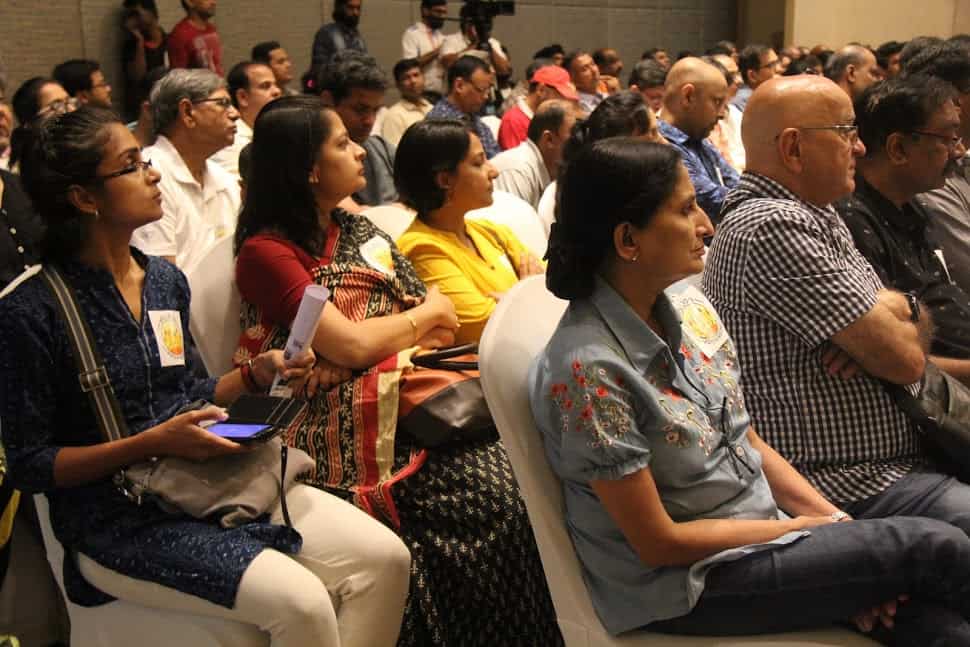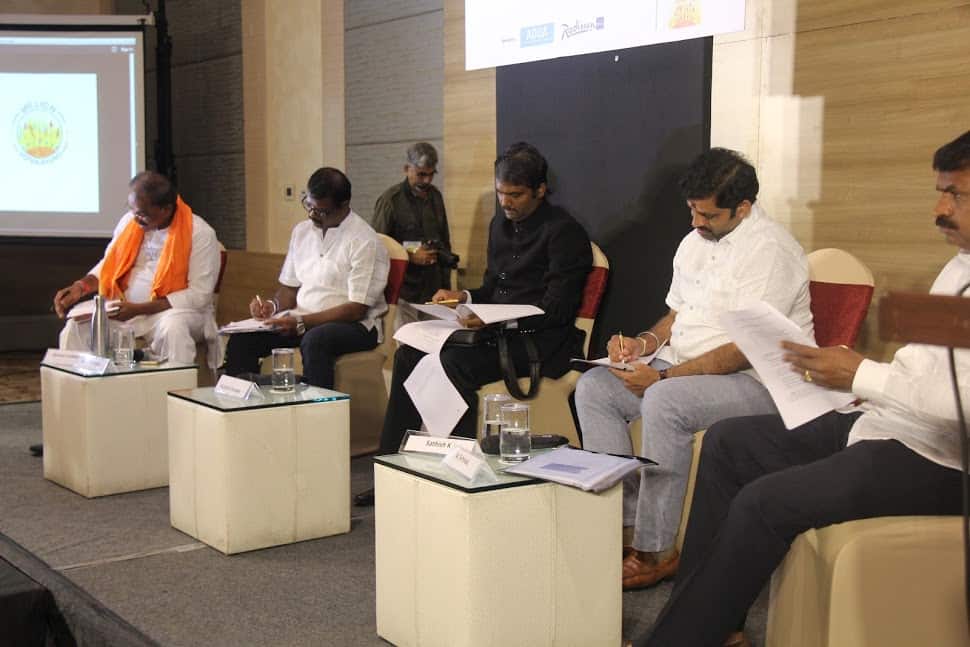On 29th April 2018, less than two weeks before the Assembly elections, Million Voter Rising, a citizen group of changemakers from Mahadevapura constituency in Bengaluru, organised an interaction with some key candidates set to contest in the elections in their constituency. This included:
- Aravinda Limbavali – Incumbent MLA (BJP)
- Bhaskar Prasad (AAP)
- Ramesh Chander (Swarajya Party)
- K Sathish (JDS)
- A C Srinivas (INC)
The opening session saw a brief presentation on the status of Mahadevapura and candidate introductions – with a general background of all the candidates, comparative statistics of their assets and the criminal cases against them. The organisers consciously chose to not mention the name of the party – because they wanted citizens to judge the candidates on their own merit, not by party or ideological positions. The topics were also focused only on the constituency, and there was little room for politics or blame games.
After this, the interaction began in earnest. Moderators V Ravichandar and Srinivas Reddy asked the candidates about what they thought were the main problems in the area and how they would go about implementing their action plan. Each candidate was given a few minutes to express their opinion in a succinct manner. All the candidates agreed that traffic, lakes, health, education, environment and infrastructure are some focus areas for development.

After the debate was a Q&A session. The audience could send in their questions both prior to the debate. The voters and the candidates gathered took a pledge to work for the betterment of the area.
Million Voters Rising shared the Mahadevapura Manifesto which included ideas and demands contributed by citizens across the eight wards for the development of the area. The candidates signed the manifesto and showed their commitment to working towards these goals if they were elected by the people.

Some of the points shared by the candidates for the questions asked.
How are you going to fix the traffic problem?
- Ramesh Chander: Incentivising public transport
- Aravinda Limbavali: We need elevated corridors and suburban railways. Metro should be extended and carpooling must be encouraged.
- K. Sathish: IT companies should be moved to rural areas. We need signal free corridors and flyovers.
- A C Srinivas: Water tanks need to be stopped. Each road should have a footpath. Commercial vehicles should be allowed only on outer ring road.
- Bhaskar Prasad: We need direct buses and better connectivity via public transport. Experts should be hired and their opinion on this matter should be taken into consideration
What will you do about lakes and water sustainability? How will lake encroachment be dealt with?
- Ramesh Chander: We need to stop contaminating lakes by creating biogas plants and public sewage treatment plants.
- Aravinda Limbavali: I have raised the issue of encroachment with the government but there has been no response. There are mafias that control this and they are being supported by the government. BWSSB is also responsible for polluting lakes. We need greater citizen involvement to protect water resources.
- K Sathish: Verdicts on lake encroachment such as the one by the A T Ramaswamy committee have not been implemented – they need to be implemented.
- A C Srinivas: Lakes have both environmental and entertainment value. There is delay in implementation of plans. Lakes and government land must be protected.
- Bhaskar Prasad: Over the past 10 years, there has been increasing lake encroachment. The government’s approval isn’t needed to save lakes, measures can be taken at the Tahsildar level. Lakes must be interlinked, rajakaluves must be identified and cleaned.
How would you deal with the lack of dry waste collection centres?
- Aravinda Limbavali: Segregation is required not just at the ward level, garbage must be processed locally. BBMP should give permission to companies that are willing to process garbage.
- K Sathish: Government land must be utilised to set up segregation centres.
- Bhaskar Prasad: 37 crores are spent every year on garbage processing, where is this money going? Garbage from other areas is also being dumped here. This leads to the mosquito menace. We need ward committees to oversee the garbage processing.
- A C Srinivas: There is a mafia because of which collecting garbage has become a problem. We must ensure that officials and contractors do their job.
How do you plan to implement your ideas?
- Ramesh Chander: As the people’s representative, it is my duty to question officials and make customer service better.
- Bhaskar Prasad: 100% attendance is central to solving issues of law and order. We don’t need new laws, as the people’s representative, I will have the power to fix corruption. Officials don’t need to give money to get positions or do their work, I will make sure of this.
- Aravinda Limbavali: Task forces will be appointed. These will include citizens and officials. Bring in privatisation to solve the garbage issue. NGT order will be implemented to deal with lake encroachment.
- Bhaskar Prasad: A way to stop corruption is to ensure that all services and information are available online, transparent and for everyone to see.
- A C Srinivas: An MLA has the power to remove corrupt officials from office. I will select honest BBMP officials, WC, ZP, TP, members.
How will you change the system and make it deliver? What is your formula?
- Aravinda Limbavali: After the elections, the government and the individual MLA has to work together. We need greater grants to ensure development and work done has to be presented in a transparent manner. License Raj is a big hurdle. Administration should be done online as well as he (A C Srinivas) suggested.
- K Sathish: Until the elections, we are politicians. After that, we only work for the people. Lake, garbage, health – all these issues will be addressed. To get the work done, we cannot hesitate to approach people from different parties, especially corporators.
- Bhaskar Prasad: I will appoint committees at the ward and panchayat level. And there will be no political people in these committees. I will take people’s opinions and bring about transparency by being inclusive.
- A C Srinivas: If a legislator has the will to work for the people, he needs the support of bureaucrats. I approached By S Yeddyurappa when he was Chief Minister.
- Ramesh Chander: I will collaborate with people from different parties and decentralise power by empowering ward committee members.
What will you do if you lose? Will you continue to work with citizen groups?
- Ramesh Chander: Elections are only a part of politics. Irrespective of whether I win or lose, I will ensure that people receive good education through Swaraj Kendras. I will continue to work for the people.
- K Sathish: Even if I lose, I will be a good opposition to the elected MLA and ensure that he does his work.
- A C Srinivas: I have met with officials and brought the CM and DC to the constituency despite not being in power. Check my mobile network over the last 5 years.
- Bhaskar Prasad: I want diversity in Mahadevapura. I don’t just want to win, I want to fix issues by taking into consideration people’s opinions and collaborating with officials.
- Aravinda Limbavali: I am from a major political party. Even if I lose, I’ll use my power to ensure development.
How will you commit to making ward committees that are representative of the people?
- K Sathish: Current leaders haven’t worked on ward committees. If elected, I will commit to the proper functioning of WCs
- Ramesh Chander: I will attend all the meetings and publish reports.
- Bhaskar Prasad: I will ensure regular meetings. I will attend all the meetings and take suggestions from the government.
- A C Srinivas: BBMP has a format for the functioning of WCs. I will commit to the implementation of this.
- Aravinda Limbavali: I will introduce a special Act for Bangalore and give more power to the 12 committees in Bangalore. Even if amendments don’t come, I will try to make Ward Committees work.
“If infrastructure doesn’t exist, no more permissions for new constructions.” Are you ready to embrace this policy?
- Ramesh Chander: Bangalore can only accommodate 25 lakh people but it currently has to bear a population of 1 crore. So my answer is yes.
- K Sathish: Basic needs must be ensured before granting permission.
- Bhaskar Prasad: We need to plan for development every year and not once in 15 years. We need to think of the future and not give permission for any more construction.
- A C Srinivas: 50% violation of building construction is the root of all problems. Yes, infrastructure needs to exist before construction.
- Aravinda Limbavali: I have already taken a step towards this and opposed the CDP proposed by BDA.
Why should people vote for you?
- Ramesh Chander: Swarajya Party is stepping into Karnataka politics is like Neil Armstrong stepping on the moon for the first time. It is a big step.
- Bhaskar Prasad: I will fight for dignified life. Issues have increased over the past 10 years – more than 20 times. Prevention is better than trying to change things now. You have given me requests, I will follow through with them.
- K Sathish: Mahadevpura has not developed in the last 10 years. IT companies don’t imply development. How we use our power is important. We have discussed many issues today, we are people’s servants not leaders. Politics is only till May 12. Mahadevapura is our area – this should be our collective slogan.
- A C Srinivas: For the past 10 years, apartments and IT parks have developed but no basic facilities are there in Mahadevapura. Government schools, land docs, footpaths, other necessities will be the focus. I will do this work with the support of the government.
- Aravinda Limbavali: I have printed my accounts and given it to the voters. My manifesto focuses on 5 areas: traffic, environment(lake and garbage),infrastructure, infiltration, PPP models/CSR. I will concentrate on these issues using task forces. I am confident that BJP government will come to power in Karnataka. I will use help from the centre and the state.
Please correct party name as Swaraj India
This was a treat to listen to. Very well organized. It really gave a sense of what it is that each candidate brings to the table. Kudos to the moderators.
Now assembly election is over but not our problem. My bylane in ward 149, block 23, 7th cross w076 is not tarred since 12 years. AE says no fund and talk to cooperator. I need help to get it on priority list of bbmp. BBMP has huge fund in relaying road which is good condition like Follow colony but no fund for my area. It’s shame.